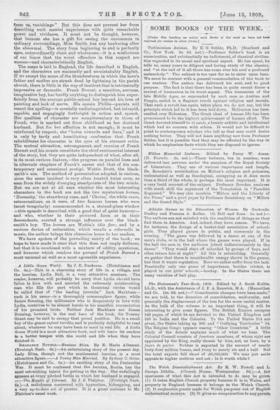• SOME BOOKS OF THE WEEK.
[Under this heading we notice such 13oolcs of the week as have not bole reorrvo4 for review in other forcikl Testimonium Anima& By E. G. Sehler, Ph.D. (Steeliest and Co., New York, 9s. Od. net.)—Professor Sehler'e boek is an examination, and substantially an indictment, of classical civilisa- tion regarded in its moral and spiritual aspect. He has spent, he tells us, many years in diligent and loving study of the classics, and "at the end of it all there has come over his soul a profound melancholy." The subject is too vast for us to enter upon here. We must be content with a general commendation of the book to our readers. The author has delivered his soul, and to good purpose. The fact is that there has been in quite recent times a revival of humanism in its worst aspect. The humanism of the late Middle Ages, as expounded by such men as Aretino and Poggio, ended in a flagrant revolt against religion and morals. That such a revolt has again taken place we do not say, but the principle which led to it has been laid down. Hellenism has been exalted over Hobraisin. The Greek ideal of human life has been pronounced to be the highest achievement of human effort. The Greek devoted himself to .1q1 KaAor, a beauty artistic and intellectual which had no concern with ethics. It would not be difficult to point to contemporary scholars who tell us that man could desire nothing batter. They will not learn anything new from Professor Sehler, but it is possible that they may be affected by the way in which he emphasises facts which they are disposed to ignore.










































 Previous page
Previous page